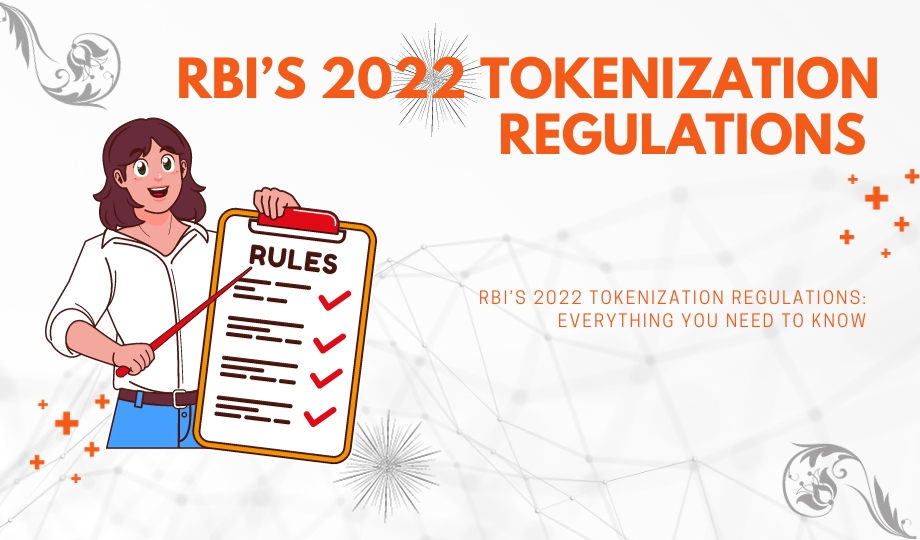In an era of rapid technological advancement, fraudulent activities, particularly concerning debit and credit cards, have seen a significant surge. Acknowledging the gravity of this situation, the Reserve Bank of India (RBI) has taken a crucial step by prohibiting merchants, payment aggregators, and online retailers from storing sensitive card data within their databases, effective from October 1, 2022. Concurrently, the RBI strongly encourages individuals to tokenize their cards, enhancing security and mitigating fraud risks.
If you’re curious about the implications of card tokenization for both customers and merchants, this article provides a comprehensive overview. It delves into the concept of tokenization, outlines the RBI’s guidelines regarding tokenization, highlights the security benefits, and discusses the impact on customers and merchants.
Understanding Tokenization:
Every debit or credit card is assigned a unique 15 or 16-digit number known as the Primary Account Number (PAN). Consumers typically share this PAN with merchants when making online purchases, making it a valuable target for fraudsters. Traditionally, PANs were stored by payment aggregators, online retailers, or digital wallets, posing a risk of data breaches. Unauthorized access to this number could facilitate illicit transactions, potentially depleting credit limits or draining bank accounts.
This is where tokenization comes into play. Tokenization involves replacing the primary account number with a unique token, a specific set of characters that only the card network can retain. This practice ensures PCI compliance for businesses while substantially reducing the risk of fraudulent transactions.
Initiating Tokenization:
To initiate tokenization, cardholders or consumers typically submit a request through their mobile banking application or a designated token requestor’s platform. Subsequently, the request is transmitted to the card network (e.g., Visa, Mastercard), and once the card issuer grants consent, a network token is issued.
Understanding Network Tokens:
Network tokens serve as distinct payment credentials, effectively replacing actual credit or debit card numbers and enhancing online transaction security. Each card’s network token is unique to the respective business. For example, if customer A holds token T for business B, a different token, T1, will be used when purchasing from business B1.
Key Guidelines Introduced by the RBI:
The new guidelines introduced by the RBI encompass the following provisions:
Use of Network Tokens: Payment aggregators must use network tokens for payment processing instead of the actual debit or credit card numbers. This safeguards customers’ privacy, preventing potential data breaches or card theft.
Token Removal Option: Payment aggregators must provide customers with an explicit option to remove their tokens from the merchant’s platform.
Consent for Card Storage: Merchants must obtain explicit consent from cardholders to store their card details and use them for recurring payments.
3D Secure Authentication: RBI mandates that every aggregator or merchant must perform 3D secure authentication before storing card details on their platform.
Advantages for Merchants:
Tokenization offers several advantages for merchants:
Reduced Fraud: Merchants can significantly mitigate the risk of data theft and card fraud, resulting in fewer chargebacks, payment declines, and interchange fees. Moreover, network tokenization may shift chargeback liability from the merchant to the issuer.
Financial Impact: Merchants processing a high volume of daily transactions can experience substantial financial benefits. Network tokenization reduces payment interchange fees, providing cumulative financial advantages.
Reduced Effort: Merchants have minimal involvement in token issuance. Once the card network generates tokens, it becomes their responsibility to update the necessary information if customers’ card data changes. This ensures a seamless user experience with minimal merchant effort.
Tokenization as a Choice:
While the RBI strongly recommends customers to tokenize their debit or credit cards for enhanced security, it remains optional. Customers retain the autonomy to decide whether they want to tokenize their cards or not. Those who opt not to tokenize their cards will be required to manually input details such as CVV, expiration date, and the full card number for payment processing.
However, merchants, payment aggregators, and online retailers are obligated to refrain from storing sensitive card data, including full PAN, expiry date, CVV, and other sensitive details. Tokenization is the mandated method for processing payments in compliance with these regulations.
Applicability of RBI Tokenization Regulations:
The RBI’s tokenization regulations are mandatory for the following entities:
Businesses Based in India Serving Indian Customers: These include businesses catering to Indian customers using domestic debit or credit cards.
Merchants or Businesses Operating Internationally: If these entities serve customers with credit or debit cards issued in India, they must adhere to the RBI’s tokenization regulations.
It’s imperative for merchants and online retailers to comply with these regulations. Non-compliance may lead to security breaches and potential legal actions against the merchant.
Cost of Tokenization for Merchants:
Merchants can tokenize cards without incurring additional costs. Tokenization is typically managed by card issuers such as Visa, MasterCard, and RuPay. Therefore, it is expected that merchants will not be charged for tokenization services.
Compliance for Merchants:
Complying with the new RBI regulations is relatively straightforward. Here are the key steps that merchants need to take:
Data Erasure: Merchants must erase all existing cardholder information from their databases and replace it with network tokens.
Customer Consent: Explicit customer consent must be obtained before saving card details. Merchants should ensure that their payment gateway facilitates this process.
PayNow Configuration: Merchants should configure a PayNow link in customer emails, allowing one-off payments in case recurring payment attempts fail.
Issue Resolution: If merchants experience increased payment failures despite complying with the regulations, they should contact their payment gateway to rectify the issue.
In Conclusion:
Tokenization may seem like an additional step for both customers and merchants, but it serves as a pivotal initiative by the RBI to combat card-related fraud. Consequently, it is essential for merchants to adhere to the guidelines and regulations set forth by the RBI, ensuring the continued operation of their businesses while safeguarding their customers against debit and credit card fraud.

